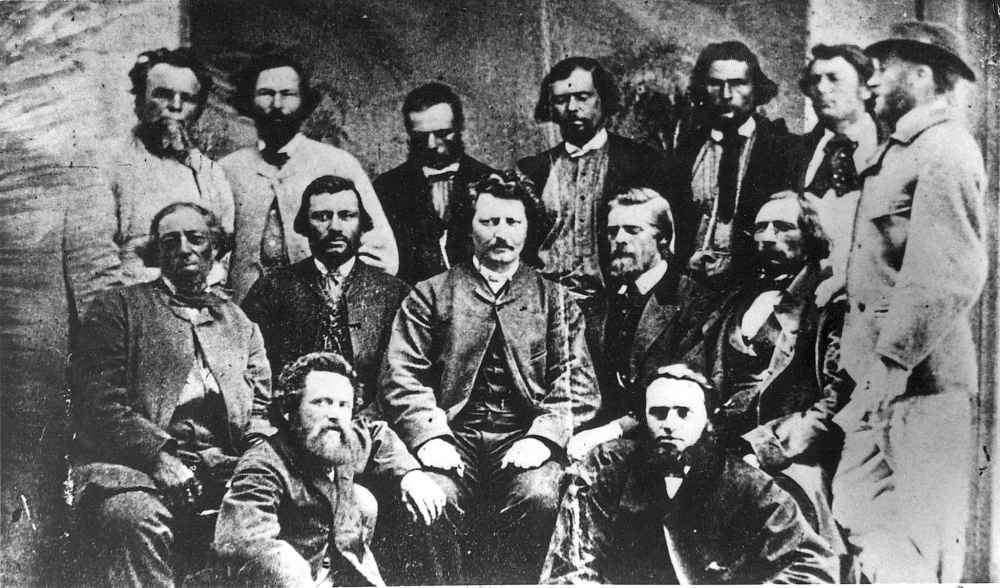Premier better hit the books Pallister's account of Red River Resistance not a good look
Read this article for free:
or
Already have an account? Log in here »
To continue reading, please subscribe:
Monthly Digital Subscription
$0 for the first 4 weeks*
- Enjoy unlimited reading on winnipegfreepress.com
- Read the E-Edition, our digital replica newspaper
- Access News Break, our award-winning app
- Play interactive puzzles
*No charge for 4 weeks then price increases to the regular rate of $19.00 plus GST every four weeks. Offer available to new and qualified returning subscribers only. Cancel any time.
Monthly Digital Subscription
$4.75/week*
- Enjoy unlimited reading on winnipegfreepress.com
- Read the E-Edition, our digital replica newspaper
- Access News Break, our award-winning app
- Play interactive puzzles
*Billed as $19 plus GST every four weeks. Cancel any time.
To continue reading, please subscribe:
Add Free Press access to your Brandon Sun subscription for only an additional
$1 for the first 4 weeks*
*Your next subscription payment will increase by $1.00 and you will be charged $16.99 plus GST for four weeks. After four weeks, your payment will increase to $23.99 plus GST every four weeks.
Read unlimited articles for free today:
or
Already have an account? Log in here »
Hey there, time traveller!
This article was published 08/11/2019 (2229 days ago), so information in it may no longer be current.
Manitoba Premier Brian Pallister needs a history lesson.
The premier, a former school teacher, wrote an op-ed piece this week in the Globe and Mail on what he believes Canada should do to promote national unity. It was published before his meeting with Prime Minister Justin Trudeau in Ottawa to discuss the country’s fractured political landscape.

Pallister appears to make reference in his piece to the 1869-70 Red River Resistance, led by Métis leader Louis Riel. But he so badly distorts the historical account of what occurred in the Red River settlement at the time, his article does anything but promote national unity.
“At this moment when discord and division loom large in our federation, and some voices even speak of leaving Canada, it’s worth remembering that Manitobans actually staged a rebellion to join Canada,” wrote Pallister. “We wanted in. And that’s where we’re staying.”
It’s a bizarre and twisted interpretation of the Red River Resistance.
The people living in what is now Manitoba, who were largely Métis and First Nation, did not stage a rebellion “to” join Canada. They were fighting the federal government’s attempt to unilaterally annex what was then Rupert’s Land. Ottawa was planning to do so without any regard for the social, economic, or land rights of the people living here.
Then-prime minister John A. Macdonald and his government made no attempt to consult with the estimated 12,000 people living in the region. There were no efforts to negotiate land issues or what type of government would be installed. It was going to be a hostile takeover.
Red River settlers may have “wanted in” to Canada, as Pallister writes. But they were only willing to do so through a negotiated entry, to ensure their social, economic, and linguistic rights were protected.
.jpg?w=1000)
The Métis had to fight for those rights. The federal government, which had just bought Rupert’s Land from the Hudson’s Bay Company, was set to take control of the region Dec. 1, 1869. But even before the official transfer of land, Macdonald sent his appointed lieutenant-governor, William McDougall, to Red River to assume office.
McDougall and his entourage had no plans to consult or negotiate with local inhabitants. They were coming to impose Canada’s sovereignty on Red River whether the people who lived here liked it or not.
The “rebellion” Pallister refers to wasn’t a rebellion at all. It was a resistance by people who already lived here in a well-established community. They had a local government, a court system, an economy, stores, bars and even a local library. It was isolated (there were no railroads here yet). But it was a thriving community with deep roots and a rich culture.
They weren’t about to let some federally appointed agent and his officials just walk in and take over their lives. Which is why they stopped McDougall, who had travelled to St. Cloud, Minn. by train (that’s as far as the steel went in those days), at Pembina and wouldn’t let him in. An enraged McDougall remained there with his staff and other federal appointees for weeks until Ottawa finally agreed to negotiate.
Riel and the Métis, who had set up a provisional government in Red River and seized control of Upper Fort Garry, sent a delegation of three to Ottawa to negotiate. They hammered out what eventually became the Manitoba Act, which is still part of Canada’s constitution today.

The Red River Resistance is an inspiring Canadian story about community, perseverance, leadership and a federal government that thought nothing of trampling on the rights of Indigenous people in the name of “nation building.”
It was an ugly battle. There was internal turmoil in Red River at the time, including the killing of Thomas Scott and a backlash from local Canadian “loyalists” who opposed the Métis resistance. It’s one of the most fascinating parts of Canadian history.
Pallister may want to brush up on that history, especially since Manitoba is preparing to celebrate its 150th anniversary next year. A premier who doesn’t know the history of his own province isn’t a good look.

Tom has been covering Manitoba politics since the early 1990s and joined the Winnipeg Free Press news team in 2019.
Our newsroom depends on a growing audience of readers to power our journalism. If you are not a paid reader, please consider becoming a subscriber.
Our newsroom depends on its audience of readers to power our journalism. Thank you for your support.










